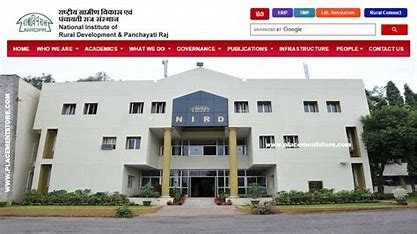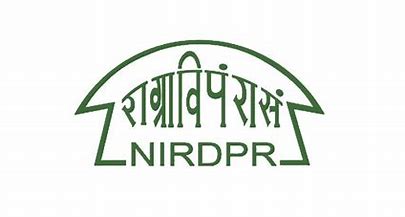
National Institute of Rural Development and Panchayati Raj (NIRDPR)

National Institute of Rural Development and Panchayati Raj (NIRDPR)
Address:
National Institute of Rural Development and Panchayati Raj (NIRDPR)
Rajendranagar, Hyderabad,
Telangana – 500 030,
India
Postal Code (ZIP Code):
500 030
About National Institute of Rural Development and Panchayati Raj (NIRDPR)
The National Institute of Rural Development and Panchayati Raj (NIRDPR), located in Hyderabad, Telangana, is India’s premier institution dedicated to the field of rural development, focusing on enhancing the quality of life in rural areas. Established by the Government of India in 1958, NIRDPR has played an instrumental role in shaping and implementing policies related to rural development, governance, and decentralization. The institute provides research, training, and consultancy services to government bodies, non-governmental organizations (NGOs), local communities, and international agencies working in the field of rural development.
NIRDPR focuses on a wide array of issues affecting rural India, including poverty alleviation, sustainable development, rural governance, agriculture, rural infrastructure, and social empowerment. The institute is an autonomous body under the Ministry of Rural Development, Government of India, and aims to promote holistic and integrated approaches to rural development through research, training, and capacity building. Over the years, NIRDPR has become a vital resource for policymakers, rural development professionals, and local leaders by providing cutting-edge knowledge, tools, and frameworks that contribute to the development of rural India.
Historical Background and Formation
The National Institute of Rural Development (NIRD) was established in 1958 by the Government of India with the primary objective of providing training and research support to strengthen the rural development programs initiated by the government. The idea behind the establishment of NIRD was to build a competent and skilled cadre of professionals who could implement rural development programs effectively and sustainably.
In 2000, NIRD’s role was expanded to include Panchayati Raj, reflecting the increasing importance of decentralized governance in rural development. The institute was then renamed National Institute of Rural Development and Panchayati Raj (NIRDPR). This shift was a response to the growing realization that effective rural development is closely linked with the empowerment of local governance institutions, especially Panchayats (local self-governments). Since then, NIRDPR has been actively engaged in strengthening Panchayati Raj Institutions (PRIs), advocating for decentralization, and promoting community-driven development in rural India.
Mission and Vision
Mission:
NIRDPR’s mission is to promote sustainable and inclusive rural development in India by strengthening the capabilities of rural development professionals, local governments, and communities. It strives to provide high-quality training, research, and consultancy services that contribute to policy-making, grassroots development, and effective implementation of rural development initiatives.
Vision:
The vision of NIRDPR is to create a knowledge hub and capacity-building platform that drives rural development in India. It envisions a rural India that is self-sustaining, socially and economically empowered, and governed by inclusive, transparent, and accountable local institutions.
Research and Areas of Focus
NIRDPR’s research spans a wide range of disciplines within the domain of rural development. The institute’s research is interdisciplinary, integrating elements of economics, sociology, political science, public administration, and environmental studies to address the complex issues affecting rural areas. The key research areas include:
- Panchayati Raj and Governance: The institute has been at the forefront of research on decentralization and the role of Panchayati Raj Institutions (PRIs) in rural governance. NIRDPR conducts studies on the effectiveness of local governance, explores the challenges faced by Panchayats, and advocates for reforms that strengthen these institutions. Research in this area also focuses on capacity-building for elected representatives, improving accountability, and enhancing the role of women and marginalized communities in local governance.
- Poverty Alleviation and Rural Livelihoods: NIRDPR’s research addresses various aspects of poverty in rural India, including the identification of poverty patterns, designing poverty alleviation strategies, and evaluating the impact of government schemes such as the Mahatma Gandhi National Rural Employment Guarantee Scheme (MGNREGS). The institute also works on sustainable livelihood promotion, skill development, and livelihood diversification, which aim to improve economic opportunities for rural populations.
- Agriculture and Rural Economy: Agriculture has been the backbone of India’s rural economy, and NIRDPR conducts extensive research on agricultural practices, rural market systems, crop diversification, water management, and sustainable agriculture. The institute works on promoting climate-smart agriculture, enhancing agricultural productivity, and addressing rural challenges related to land ownership, land use, and access to markets.
- Social Empowerment and Inclusive Development: The institute focuses on research related to the social and economic empowerment of rural communities, particularly marginalized groups such as women, Scheduled Castes (SCs), Scheduled Tribes (STs), and backward classes. Research in this area examines barriers to access in education, health, and employment and proposes strategies for creating more equitable rural societies.
- Rural Infrastructure and Sustainable Development: NIRDPR’s research also covers rural infrastructure development, including the provision of basic services such as water, sanitation, roads, and energy. The institute promotes sustainable development practices and works on projects that integrate environmental concerns into rural development, with a special focus on green energy, water conservation, and climate change adaptation.
- Decentralized Planning and Rural Development Policies: NIRDPR plays a key role in developing frameworks for decentralized planning, where local communities and Panchayats are involved in decision-making processes. The institute conducts research to evaluate the effectiveness of rural development policies and suggests changes to make them more inclusive and sustainable.
Training and Capacity Building
One of the primary functions of NIRDPR is to provide training and capacity-building programs for government officials, Panchayat leaders, development professionals, and NGOs working in the rural sector. The institute’s training programs are designed to equip these stakeholders with the skills, knowledge, and tools necessary to implement rural development programs effectively. These programs include:
- Short-Term Training Programs:
These programs are aimed at enhancing the skills of rural development professionals and local governance bodies in specific areas such as financial management, gender mainstreaming, project planning, social audits, and community participation. They are typically targeted at frontline workers, Panchayat leaders, and officials involved in rural governance. - Long-Term Capacity Development Programs:
NIRDPR offers post-graduate programs and diplomas in rural development, social work, and Panchayati Raj, which provide in-depth training to students and professionals interested in pursuing careers in rural development. These programs are designed to produce a new generation of skilled rural development professionals capable of leading community-driven initiatives. - Online Training and Webinars:
Recognizing the increasing role of digital platforms, NIRDPR also offers online training modules and webinars to reach a wider audience. These programs focus on areas like digital governance, e-governance, rural entrepreneurship, and data analytics in rural development. - Training for Elected Representatives:
NIRDPR conducts specific training programs for elected representatives in Panchayats, focusing on their roles and responsibilities in local governance, leadership skills, and community mobilization. The goal is to improve the effectiveness of elected leaders and encourage them to play a more active role in rural development.
National and International Collaborations
NIRDPR collaborates with a wide range of national and international organizations to enhance the impact of its research and training programs. The institute works with various governmental bodies, including the Ministry of Rural Development, State Governments, and Panchayat Raj institutions, to implement its research findings and facilitate policy reforms.
On the international front, NIRDPR has partnered with organizations such as the United Nations Development Programme (UNDP), World Bank, and International Labour Organization (ILO). These collaborations help NIRDPR to engage in global dialogues on rural development and adapt international best practices to India’s unique socio-economic and cultural context.
Key Achievements and Impact
Since its inception, NIRDPR has played a central role in shaping India’s rural development landscape. Some of its key achievements include:
- Capacity Building of Panchayats: NIRDPR has been instrumental in empowering elected representatives of Panchayats, improving their capacity to govern effectively, and ensuring that local governance becomes more democratic, transparent, and accountable.
- Research and Policy Influence: NIRDPR’s research has contributed to the formulation of key rural development policies and programs, including the MGNREGA, Pradhan Mantri Awas Yojana (PMAY), and the National Rural Livelihood Mission (NRLM). The institute has also influenced policy changes in areas such as rural water management and sustainable agricultural practices.
- Promoting Rural Livelihoods: Through its research and training programs, NIRDPR has promoted rural livelihoods by fostering entrepreneurship, supporting skill development initiatives, and creating sustainable income-generating opportunities for rural communities.
Conclusion
The National Institute of Rural Development and Panchayati Raj (NIRDPR) is a pioneering institution in the field of rural development. Through its research, training, and capacity-building programs, NIRDPR continues to play a significant role in shaping rural India’s development trajectory. The institute’s focus on decentralization, community empowerment, and sustainable development makes it a crucial player in addressing the complex challenges faced by rural India. By fostering innovation, strengthening local governance, and promoting inclusive growth, NIRDPR is contributing to the creation of a more prosperous, equitable, and self-reliant rural India.
Courses/Programs
| Serial# | Title | Estimated Cost | Program type |
|---|
Campuses
Reviews
Average rating
0.0 / 5
Rating breakdown
Submit your review
